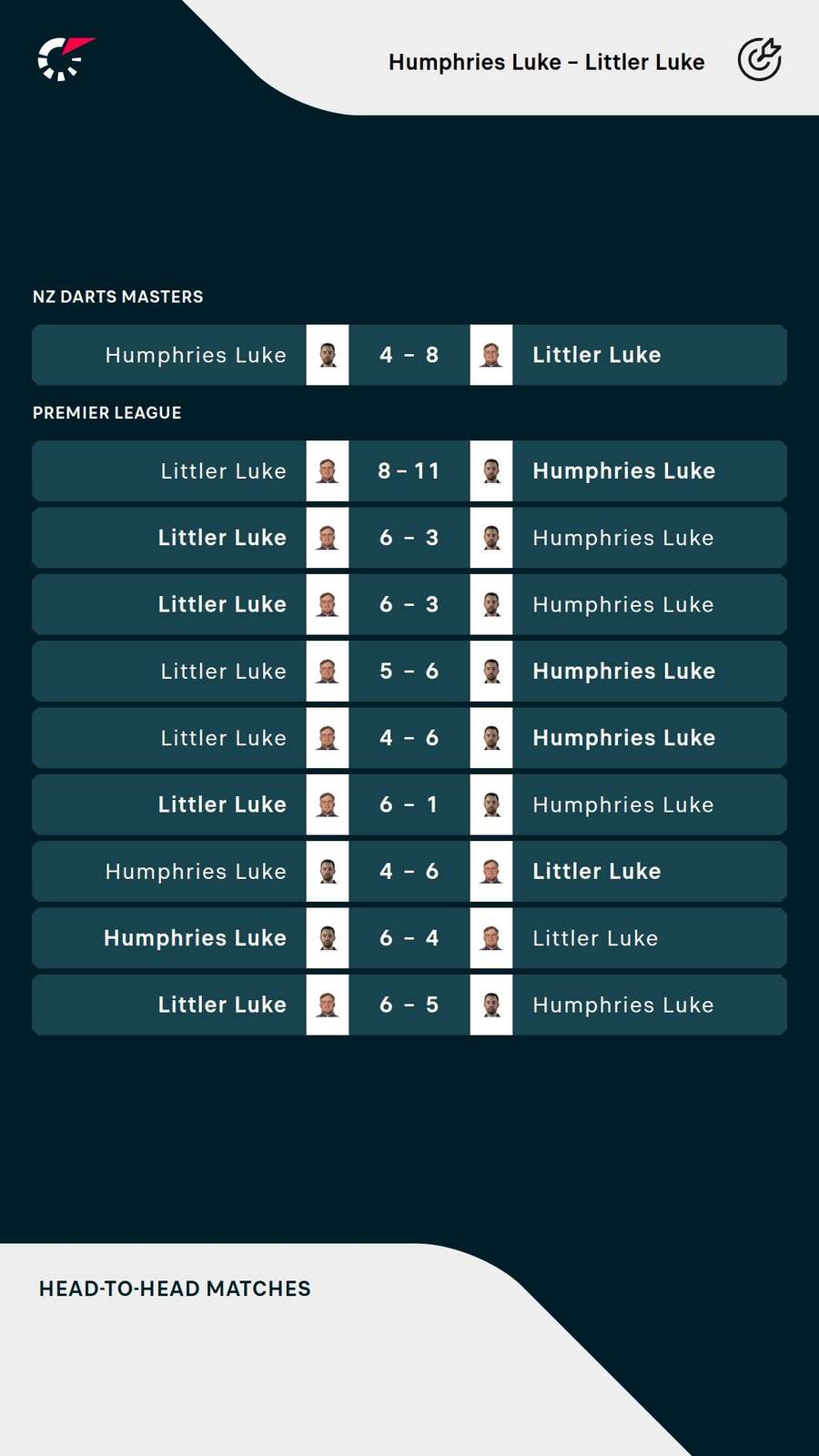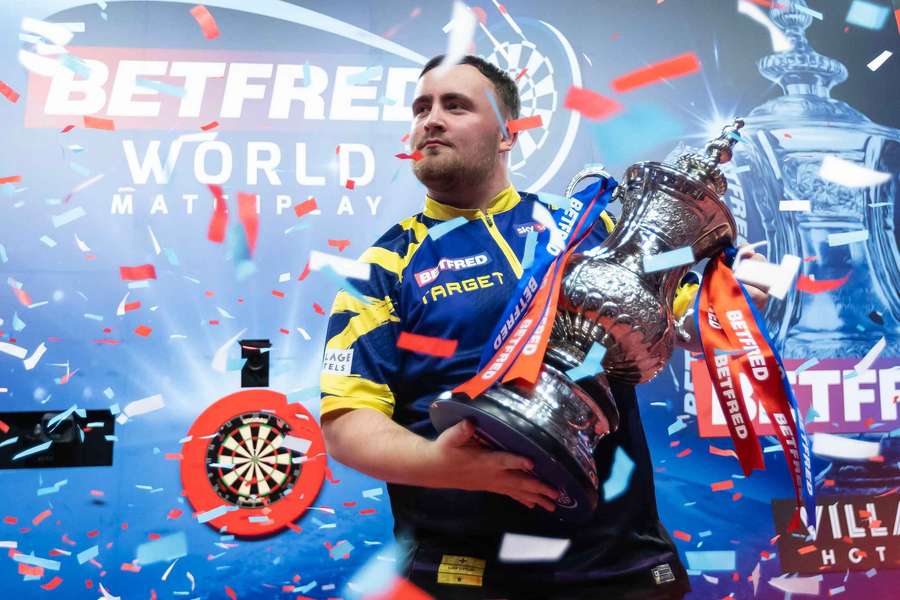He became the youngest ever world champion at Alexandra Palace in January 2025, aged just 17 years and 347 days, and followed it up with the most audacious six months of silverware the sport has seen from a debutant.
By the end of July, he had completed the Triple Crown - World Championship, Premier League, Matchplay - an achievement that took Phil Taylor nine years from his first world title and Michael van Gerwen four.
The manner of it is as striking as the milestones.
Littler does not project dominance through menace or drama, but through precision. His throw is compact and repeatable, delivered at brisk tempo without a flicker of stage nerves.
Where Phil Taylor used intimidation - eye contact, body language, and an almost gladiatorial presence - Littler's expression often barely changes.
Where Van Gerwen dismantled opponents with explosive scoring bursts, Littler accumulates advantages relentlessly, one treble at a time, until a scoreboard that once looked manageable becomes a mountain. He does not beat you in moments; he wears you down with inevitability.
The numbers reinforce the impression that Littler is not just winning, but doing so at historic levels. Across his past 200 competitive legs, his three-dart average sits at 103.22, supported by more than 100 maximums. Only one other player, Josh Rock, manages to average over 100 (101.11) over that same period.
His Premier League debut season was record-breaking: the first player ever to win five nightly sessions, posting a 102.5 average in the final, while racking up 138 maximums across the campaign.
At the World Matchplay, he produced a nine-darter against Josh Rock, hit 64 maximums - a record for the tournament - and averaged 107.24 in the final against James Wade, the highest ever in a Matchplay final.
In Auckland, he delivered a record 115.02 in a World Series final, obliterating world number one Luke Humphries, who could only admit afterwards that he had felt "powerless."
Even Littler’s streaks have been historic. His streak of 222 consecutive matches with at least one 180 - finally broken earlier this month - was less a statistic than a symbol of how sustained his standard has become.
He was also the youngest ever to hit a televised nine-darter, aged 16 at the 2024 Bahrain Masters, and already owns four televised perfect legs, sixth on the all-time list. When he is not breaking records, he is setting benchmarks that force everyone else to chase.
The comparisons with Taylor and van Gerwen - two undeniable icons of the sport - are therefore pretty obvious.
But let's not forget, Taylor was 29 when he won his first world title, while MVG was 24. Both became the dominant forces of their eras, but neither achieved anything like Littler's haul as a teenager. The Dutchman's youth title at 17 arguably hinted at greatness, but it took a few years for the trophies to come.
Littler needs a rivalry
Yet dominance without resistance is rarely remembered quite as fondly. You can argue Taylor became Taylor because of Van Barneveld. Van Gerwen's aura was defined not only by his statistical peaks but by spellbinding duels with Gary Anderson.
Littler, for all his brilliance, still needs rivals.
Humphries still has moments of superiority. His Premier League triumph in June confirmed he can still operate at an elite level - with a highest three‑dart average for 2025 of 101.77 and a 55% success rate in 15‑darter finishes.
But the pattern is troubling. When Littler clicks into his highest gear - as in Auckland - Humphries appears reduced to survival.

Their head-to-head now sits narrowly in Littler's favour, and unless Humphries can start to dictate on stage rather than react, history may begin to cast him as second fiddle.
Van Gerwen is another key axis. He remains too good to dismiss, still reaching finals and still capable of suffocating opponents with his scoring power. But the days of inevitability seem to be gone.
Littler has already beaten him on the grandest stage, and the dynamic has shifted: Van Gerwen now measures himself against Littler, rather than the other way around.
For darts, it is a fascinating tension - the old force of nature against the new immovable object. But as Littler consistently begins to edge their contests, it could be that we're witnessing a complete changing of the guard.
And then there is the younger pack. Josh Rock is the most dangerous, blessed with power scoring, fearlessness and pace. In Blackpool, he forced Littler into a nine-darter to escape, a contest that felt less like a cameo and more like a foreshadowing of a rivalry to come.
Martin Schindler is another, a quieter operator but no less effective - his role in Germany’s first World Cup triumph alongside Ricardo Pietreczko was a genuine breakthrough. Gian van Veen has also shown flashes of the heavy scoring that could one day trouble Littler, while Pietreczko himself, mercurial but talented, is capable of producing the kind of disruptive darts that can pull an opponent out of rhythm.
World's best lagging behind?
Head-to-head records make clear why Gerwyn Price, Stephen Bunting, Nathan Aspinall and Rob Cross remain adrift.
Price averages just under 99 with a 44% checkout rate, which is solid but insufficient. After initially acting as a spoiler in their early career meetings, the Welshman has begun to struggle against Littler recently. Bunting, despite a respectable 98.5 average, has lost six of his last 10 against him, including a 6-0 whitewash in the Premier League.
Aspinall has shown flashes - he averaged 99.9 in Poland - but Littler's 104.8 still saw him through 6-3. Cross hates playing Littler, losing nine of his last 10 meetings. In every case, the numbers underline the point: Littler is not only outperforming them on averages and checkouts, but he is beating them consistently on stage.

James Wade pointed out that while averages are higher than ever, the game "risks losing its drama" after being "bashed up" by Littler in the UK Open final. It's a fair shout. Watching Littler at his best is like watching a clinic. But sport doesn't thrive on clinics; it thrives on contests.
What makes Littler a fascinating character, though, is that he is not simply dominating - he is accelerating everyone else. Humphries' consistency, Rock's emergence, and Schindler's progress are all sharpened by the need to match a teenager who is already performing at historic levels. He has raised the bar to a height that forces adaptation. That is what Taylor did, what Van Gerwen did, and what Littler is now doing.
For Littler, the question is not whether he wins - he obviously will. Probably loads.
It is whether he can turn his efficiency into an era that endures, into rivalries that capture imaginations, into drama as well as dominance.
Greatness is never measured by trophies alone, but by the contests that defined them. Littler already appears to be the next great benchmark. The sport's future will be judged on who rises with him.
Because talent alone does not define an era. Rivalries do.

